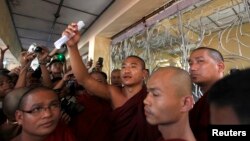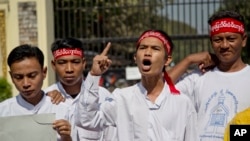Gambira has suffered more than most political activists in Myanmar.
Arrested for his prominent role in a monk-led pro-democracy uprising in 2007, dubbed the Saffron Revolution, soldiers beat him so severely, he said, he sustained brain damage and has endured post-traumatic stress disorder and delusions ever since.
Days before the National League for Democracy (NLD), led by Aung San Suu Kyi, forms Myanmar's first fully elected civilian government in half a century, Gambria is among hundreds of activists who find themselves still behind bars.
Human rights monitors say there has been an escalation in threats and harassment by military-aligned authorities in the run up to Myanmar's highly-anticipated transfer of power. And legal experts warn that the incoming government will face serious obstacles in securing the activists' freedom.
Gambira, whose real name is Nyi Nyi Lwin, was sentenced to 68 years in prison by the military junta, but freed in a general amnesty in January 2012.
At the time Myanmar was just beginning its political reforms and his release along with some thousand other prisoners of conscience was touted as evidence of the country's dramatic change.
But despite a pledge by President Thein Sein to free all political prisoners, a new report by Amnesty International says that since 2014, "the authorities have intensified their crackdown on basic freedom and dissent."
"The authorities have resorted to tried and tested tactics to silence dissent," said Laura Haigh, a Myanmar Researcher at Amnesty International. "I think what's really worrying is how that's continued even after the [November] election – for me that raises serious concerns about whether the entrenched establishment is really willing to cede power."
Freed, then arrested again
Although Gambira had a number of run-ins with the authorities after his release from prison, he had been living in relative peace with his wife in northern Thailand, where he was seeking medical treatment for his psychological trauma. From time to time, the former monk spoke to the media about ongoing human rights abuses in Myanmar, including the persecution of the Rohingya Muslim minority.
After several unsuccessful attempts to obtain a passport from the embassy in Thailand and failing to process an asylum application through the United Nations, the couple decided to risk returning to Myanmar in January.
"I didn't want to go but he thought that it would be OK. ‘There is a new government coming in' he told me," explained his wife Marie Siochana. "When we arrived in [Gambira's hometown] Meiktila, the [police] were waiting for us."
He was accused of unlawfully entering the country and charged under Myanmar's archaic immigration law, which carries a five year jail term. According to Siochana, they crossed the Thai-Myanmar border through an official border point and had all the necessary documents. In the weeks before he crossed, friends had spotted wanted posters of the former activist.
Despite his well-documented health issues, the judge has repeatedly denied him bail.
"They probably saw that he had a good life and that he was happy and wanted to make him suffer more," said Siochana.
There are at least 90 political prisoners in Myanmar and hundreds more awaiting trial, according to monitoring groups. Many are young students arrested for staging peaceful protests against a controversial education law last year, with organizer Phyoe Phyoe Aung risking nine years in jail. The government has maintained that people are being prosecuted in accordance with the law.
"It is very complicated between freedom of expression and rule of law. According to our existing laws some activities are restricted," said Zaw Htay, director of the President's Office in Myanmar. "All governments have to maintain stable law and order… It is not just a political issue but a legal issue."
Change in tactics
But Amnesty International says the authorities have adapted their tactics since the introduction of a reform-era law on peaceful assembly to boost jail terms. This includes prosecuting activists under multiple statutes or trying them for the same offense in several townships. At his last hearing, prosecutors implied that Gambira may also be charged for alleged immigration offenses dating back to 2013 – a move that could potentially double his sentence.
Despite the NLD's resounding victory in general elections last year, the military continues to exert substantial political power and controls a quarter of all seats in parliament. Both the Home Affairs ministry and the police force will continue to be led by members of the armed forces.
Activists have called on the incoming government to amend or abolish a tangle of authoritarian laws that can easily be used to quash dissent.
"The immigration law has been used many times to arrest peaceful activists," added Haigh. "As long as [these laws] are there on the books, the authorities can and will find any reason to arrest you if they want to and that's definitely what happened in the case of Gambira."
Gambira's lawyer, Robert San Aung, who describes his trial as a "revenge case," worries the NLD will face confrontations with the military.
Under Myanmar's constitution, presidential amnesties can only be granted in cooperation with the military-dominated National Defense and Security Council, and individual pardons only become applicable once a person has been sentenced. Dozens of student activists have been awaiting trial since early last year.
"The government views these people as their enemies," said Robert San Aung, speaking outside Gambira's court hearing in Mandalay. "They are holding grudges. They can't easily forgive and forget."
Pressure from the international community appears to have waned since Aung San Suu Kyi swept the polls in historic elections in November.
"We need to put pressure on the Commander in Chief [Min Aung Hlaing] and the armed forces to stop human rights violations across the country," said Bo Kyi, Joint Secretary of the Assistance Association for Political Prisoners (Burma), adding that political reform will be impossible without the military's cooperation.
When contacted by VOA, a spokesperson for the NLD declined to comment on their strategy for releasing political prisoners, even though Aung San Suu Kyi has insisted it will be one of her top priorities.
"I can't answer about this subject because the [current] government is not finished yet. After the new government [takes over] we will speak about this subject," said Central Executive Committee member Nyan Win. "There are so many issues about political prisoners – who are political prisoners, what's the situation for political prisoners – so many things we have to think [about] so right now we can't say anything."
Yet Gambira is optimistic that he will be freed once the NLD takes power. "I expect the new government will bring real democracy to Burma."






